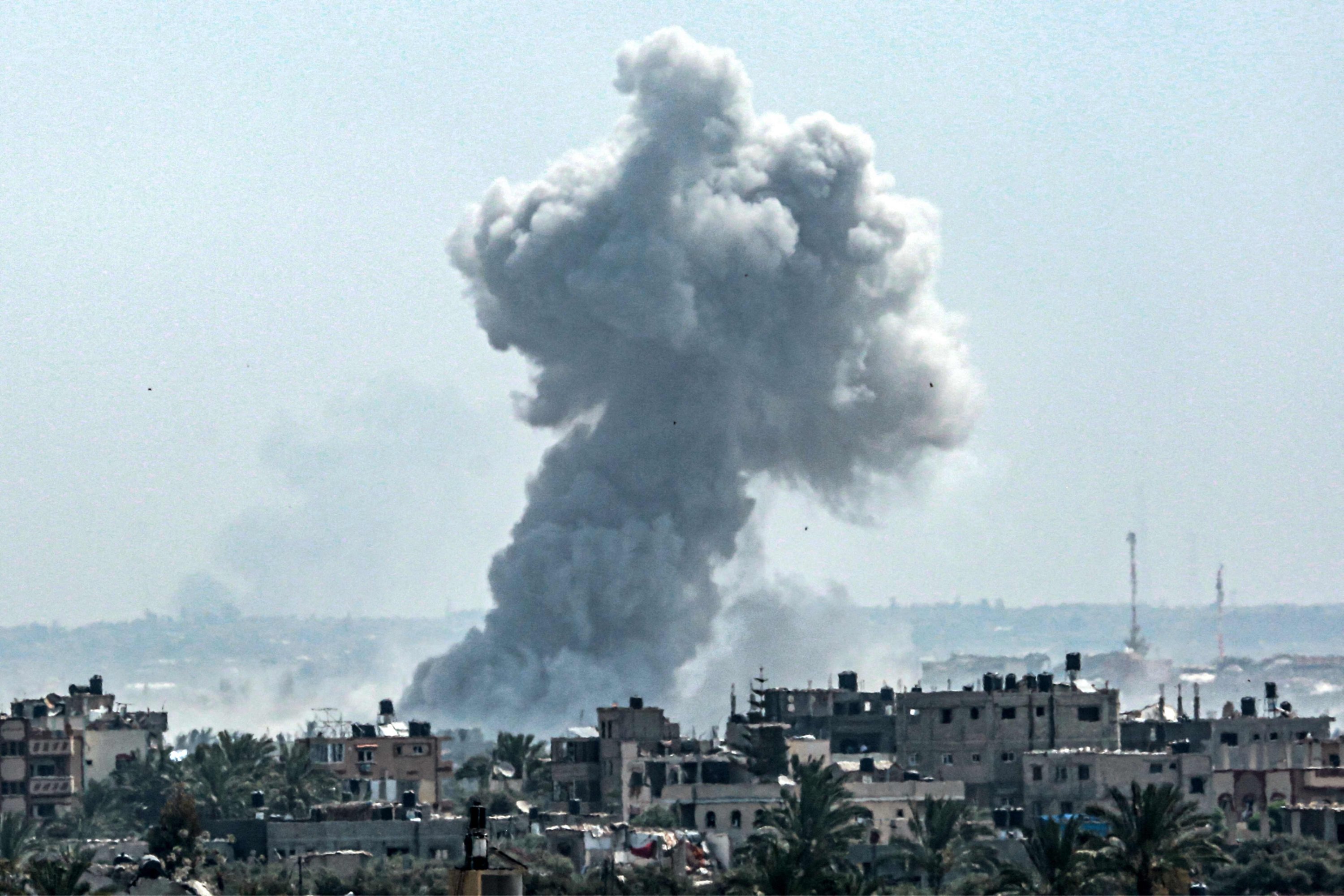© Turkuvaz Haberleşme ve Yayıncılık 2024
Israeli violence showed no sign of ebbing as its genocidal war on Gaza entered the 200th day on Tuesday with fears mounting of an Israeli invasion in the overcrowded southern Rafah.
The Israeli army carried out intense shelling overnight of the Gaza neighborhoods of al-Tuffah, Shujaiya and Zeitun, according to reports.
Shelling and loud explosions were heard in southwest Gaza and Khan Younis in the south, while airstrikes struck near the Bureij refugee camp and artillery fire hit the Nuseirat refugee camp.
The military said it struck several Hamas positions in south Gaza at night, with its warplanes hitting about 25 targets including military observation and launch posts.
The war was triggered by the Oct. 7 Hamas incursion that resulted in the deaths of 1,170 people, according to an AFP tally of Israeli official figures.
About 250 people were abducted to Gaza during the incursion, of whom 129 remain in the Palestinian territory. Israel says 34 of them are dead.
German Foreign Minister Annalena Baerbock on Tuesday called for the release of the hostages in a post on social media platform X, formerly Twitter.

In retaliation for the Hamas incursion, Israel launched a genocidal war that has so far killed at least 34,183 people in Gaza, mostly women and children, according to the Health Ministry.
The latest ministry toll issued Tuesday included least 32 deaths in the past 24 hours.
For Palestinians in Gaza, Monday was a day of fresh horror, with the territory's Civil Defense agency saying about 200 bodies were uncovered in the past three days of people killed and buried by Israeli forces at the Nasser Hospital in Khan Younis.
The Israeli military has yet to respond to an AFP request for comment on the matter.
On Monday, Israel's military intelligence chief, Maj. Gen. Aharon Haliva, resigned after taking responsibility for failures leading to the Oct. 7 incursion.
Public pressure has mounted on the government of Israeli Prime Minister Benjamin Netanyahu to strike a deal that would secure the release of the remaining hostages.
Meanwhile, global opposition has also mounted over the civilian toll of Israel's Gaza offensive which has turned vast areas into rubble and sparked fears of famine.
The United Nations says "multiple obstacles" continue to impede delivery of urgently needed aid for Gazans desperate for food, water, shelter and medicine.
But Netanyahu has vowed to press on with a planned offensive on Rafah, the town on the border with Egypt where most of Gaza's 2.4 million population is now sheltering.
Citing Egyptian officials briefed on the Israeli plans, the Wall Street Journal said Israel was planning to move civilians from Rafah to nearby Khan Younis.
The operation would last two to three weeks and be done in coordination with the United States, Egypt and other Arab countries including the United Arab Emirates (UAE), the Journal reported.
Israel would then send troops into Rafah gradually, targeting areas where Hamas leaders are allegedly hiding, in a military operation that would last six weeks, it added.
Foreign ministers of the G-7 group of developed economies have said they oppose a "full-scale military operation in Rafah" because of the "catastrophic consequences" for civilians.
World leaders called for restraint after Israel reportedly carried out a strike on Iran in response to an unprecedented drone and missile attack by the Islamic republic on its arch-enemy.
The apparent tit-for-tat exchange sent jitters around international financial markets, amid fears that it could spark a wider conflict in the oil-rich Middle East.

But analysts said Israel's strike was deliberately limited in scope but designed to send a clear warning to Iran's leadership about its ability to hit sensitive targets.
Iran's Lebanese ally Hezbollah said an Israeli strike killed one of its fighters Tuesday. An AFP journalist said the fighter's vehicle had been completely burnt out in the strike deep inside Lebanese territory some 35 kilometers (22 miles) from the Israeli border.
Since Oct. 7, there have been near-daily cross-border exchanges between the Israeli army and Hezbollah, a Hamas ally.
The U.S. Senate is set to vote Tuesday on an aid package for its allies, including Israel, that is expected to land on President Joe Biden's desk for his approval by the end of the week.
It earmarks $13 billion for Israel in its war with Hamas and more than $9 billion for humanitarian assistance in Gaza.
